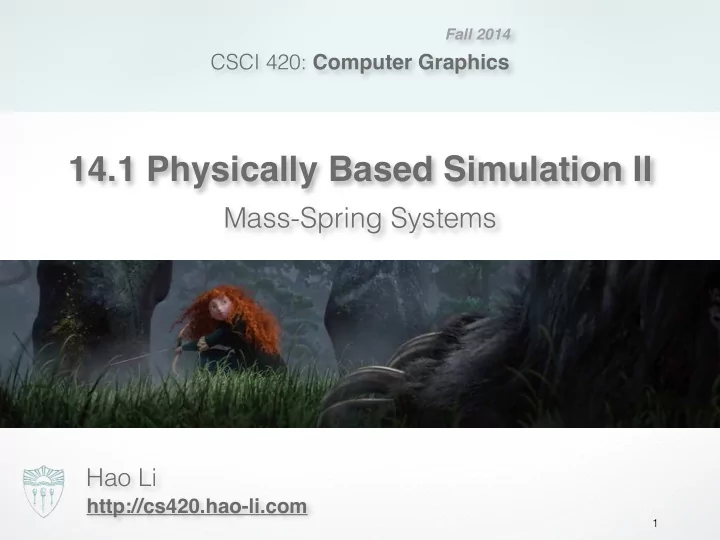

Fall 2014 CSCI 420: Computer Graphics 14.1 Physically Based Simulation II � Mass-Spring Systems Hao Li http://cs420.hao-li.com 1
Mass-Spring Systems • The 101 of Physics Simulation � � • What do we want to simulate? Deformable Objects � • Design a model. Mass points + springs. • Write differential equations. Newton’s 2nd Law (Hooke) • Discretize equations. Integration methods for ODEs • Add interaction. Collision detection + response • Simulate! 2
Mass-Spring Systems • Simulation of cloth based on deformable surfaces (Polygonal mesh) • Realistic simulation of cloth with different fabrics such as wool, cotton, or silk for garment design 3
Facial Animation • Simulation of facial expressions based on deformable surfaces/volumes/muscles • Animation of face models from speech and mimic parameters 4
Medical Simulation • Simulation of deformable soft tissue • Surgical planning • Medical training 5
Overview • Model and Physics • Implementation Hints • Time-Discretization • Collision Response • (Simulation Loop) 6
Mass-Point System • Discretization of an object into mass points (gas, fluid, elastic object, inelastic object) • System with multiple mass centers (Planetary System) • Interaction between points i and j ≠ i based on internal forces • All other forces at point i are external forces • Overall force 7
Mass-Point System • Discretization of an object into mass points • Representation of forces between masses by springs • Computation of dynamics
Mass-Points
Physically-based Equations
Elastic Forces: Springs
Elastic Energies
Forces at a Mass Point
Dissipative Forces
System Equations
System Equations
Overview • Model and Physics • Implementation Hints • Time-Discretization • Collision Response • (Simulation Loop) 17
Elastic Spring 18
Mass Point 19
Force Computation 20
Overview • Model and Physics • Implementation Hints • Time-Discretization • Collision Response • (Simulation Loop) 21
System Equations 22
Solution 23
Problem 24
Numerical Integration Methods 25
Numerical Integration Methods 26
Explicit Integration 27
Explicit Integration 28
Explicit Integration 29
Error Accumulation 30
Problems 31
Improving Accuracy - Leap Frog 32
Improving Accuracy - Runge Kutta 2nd order (midpoint method) 33
Midpoint vs Euler 34
Implementation 35
Avoiding Instability 36
Topology and Stability 37
Volumetric Models - Tet Meshes 38
Topology Ambiguity Problem 39
Cloth Forces 40
Cloth Springs 41
Cloth Springs 42
Cloth Springs 43
http://cs420.hao-li.com Thanks! 44
Recommend
More recommend